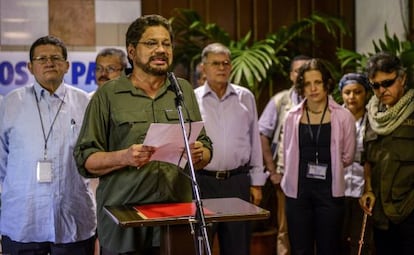Colombia rejects FARC’s proposal to postpone next year’s elections
Guerrilla leader believes campaigning will jeopardize Havana peace talks

The Colombian government on Tuesday rejected a proposal by representatives of the Revolutionary Armed Forces of Colombia (FARC), who are meeting for peace talks in Havana, to postpone the 2014 general elections for at least one year.
The offer was made by FARC commander Iván Márquez, chief negotiator for the guerrilla group, just as the 10th round of talks with the Colombian government was getting started. It also comes at a critical moment for Colombia’s President Juan Manuel Santos, who just over two weeks ago was lauding the first agreement reached with the FARC over agrarian reform — one of the six pending issues on the peace agenda.
This second round of negotiations will center on the insurgency’s future, including political participation and disarmament of the guerrillas.
By delaying the elections for president, members of Congress, governors and mayors, Márquez explained that it would prevent political campaigning from jeopardizing the peace process.
There is no chance I would consider a proposal to extend terms” President Santos
“Let us open a national debate about the urgency and propriety of postponing the electoral calendar for a year,” said Márquez, whose real name is Luciano Marín Arango, adding that a constituent assembly should be formed to discuss the postponement.
Humberto de la Calle, the Colombian government’s chief negotiator, immediately rejected the proposal. “We should not distract ourselves with proposals that contribute little to clarity, as is the case with the proposed prolongation of elected terms in office,” De la Calle said. “That won’t work; a constituent [assembly] will not work.” Santos, who is expected to run for a second term next year, also rejected the proposal.
“There is not even the most minimal chance I would consider that proposal to extend terms,” the president told Colombia’s Caracol radio network from Jerusalem, where he is on an official visit. “That is completely out of the question.”
De la Calle said that talks instead need to focus on opening a path for the FARC to transform itself into a legitimate political grouping.
The FARC — Latin America’s oldest insurgency — has for the past 50 years been waging a guerrilla war that has claimed thousands of lives.
The Colombian government said that it wants to ensure that there are guarantees for political groupings that emerge from the peace process as well as participation for all citizens.
Some observers believe the FARC fears that there won’t be enough time for the guerrillas to prepare for next year’s elections if an agreement is reached in the coming months. Another concern is that any peace proposal that is agreed upon will have to be approved by Congress and there is no guarantee that Santos’s coalition will continue to have a majority after next year's elections. Some opposition parties, and even ultra-conservatives inside Santos’s own coalition, are against the peace talks.
One person who has been insisting that agreements be reached as soon as possible is Senate Speaker Roy Barreras. He led a delegation of Colombian lawmakers in March to encourage the FARC to agree to a peace process so that it can be ratified while Santos has a majority. But when asked about the FARC’s proposed postponement, however, Barreras said that any such delay would be unconstitutional.
Tu suscripción se está usando en otro dispositivo
¿Quieres añadir otro usuario a tu suscripción?
Si continúas leyendo en este dispositivo, no se podrá leer en el otro.
FlechaTu suscripción se está usando en otro dispositivo y solo puedes acceder a EL PAÍS desde un dispositivo a la vez.
Si quieres compartir tu cuenta, cambia tu suscripción a la modalidad Premium, así podrás añadir otro usuario. Cada uno accederá con su propia cuenta de email, lo que os permitirá personalizar vuestra experiencia en EL PAÍS.
¿Tienes una suscripción de empresa? Accede aquí para contratar más cuentas.
En el caso de no saber quién está usando tu cuenta, te recomendamos cambiar tu contraseña aquí.
Si decides continuar compartiendo tu cuenta, este mensaje se mostrará en tu dispositivo y en el de la otra persona que está usando tu cuenta de forma indefinida, afectando a tu experiencia de lectura. Puedes consultar aquí los términos y condiciones de la suscripción digital.








































